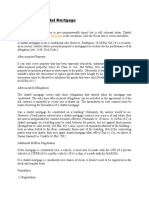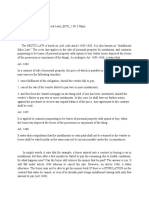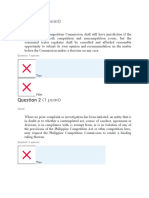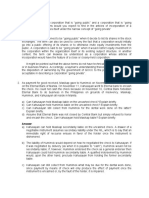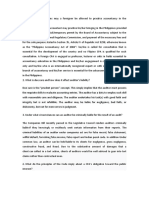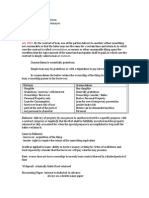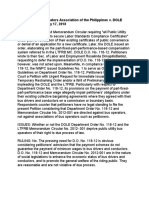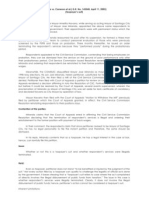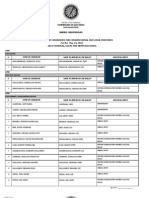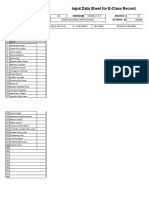Competition Law: First Abuse of Dominance Case by The Philippine Competition Commission
Competition Law: First Abuse of Dominance Case by The Philippine Competition Commission
Uploaded by
Anonymous r1cRm7FCopyright:
Available Formats
Competition Law: First Abuse of Dominance Case by The Philippine Competition Commission
Competition Law: First Abuse of Dominance Case by The Philippine Competition Commission
Uploaded by
Anonymous r1cRm7FOriginal Title
Copyright
Available Formats
Share this document
Did you find this document useful?
Is this content inappropriate?
Copyright:
Available Formats
Competition Law: First Abuse of Dominance Case by The Philippine Competition Commission
Competition Law: First Abuse of Dominance Case by The Philippine Competition Commission
Uploaded by
Anonymous r1cRm7FCopyright:
Available Formats
Competition Law: First Abuse of Dominance Case by the
Philippine Competition Commission
October 3, 2019 by Jericho Del Puerto
This is the first abuse of dominance case in the Philippines making it a landmark case for
the Philippine Competition Commission (PCC).
A Mass Housing Developer entered into an exclusive deal with its Internet Service Provider
in nine (9) projects across the country.
The companies admitted to their conduct and proposed a settlement.
The PCC ordered their breakup, imposed a Php27.11 million fine, and directed them to
comply with the settlement terms and conditions.
Section 15 of the Philippine Competition Act prohibits exploitative and exclusionary
conduct that substantially lessens competition.
Sometime in March, through a Statement of Objections, the Philippine Competition Commission
(PCC) through its Competition Enforcement Unit charged a Mass Housing Developer with abuse of
confidence. The said company limited unit owners and tenants to a sole Internet Service Provider
(ISP) and thus preventing them from availing of another service. The residents complained that the
in-house ISP service, “Fiber to Deca Homes”, was slow, expensive, and unreliable.
Section 15 of the Philippine Competition Act prohibits exploitative and exclusionary conduct that
substantially lessens competition. This is the basis for the abuse of dominance charge.
In response, the respondent companies offered to settle and correct their anticompetitive conduct
through a settlement terms, which was made available for public comments and eventually
submitted for resolution.
“Competition—or lack of it—can be felt at home, at work, and in one’s daily activities. The residents
may have chosen Urban Deca as their address, but the condo developer should not limit the choices
of residents for other services,” said PCC Chairman Arsenio M. Balisacan.
Accordingly, the PCC ordered their breakup, imposed a Php27.11 million fine within thirty (30)
days, and directed them to comply with the settlement terms and conditions. While the case
originally stemmed from complainants in Urban Deca Manila in Tondo, the terms applied to eight
(8) other Urban Deca projects in Mandaluyong, Muntinlupa, Bulacan, Cavite, Iloilo, and Cebu.
Acknowledging it as a landmark case for the PCC, Balisacan notes that the regulatory body
“successfully resolved to stop an anticompetitive practice, restore competition in the affected
market, and set as example to deter other businesses from employing similar exclusive dealings.”
“Let this be a warning to businesses that abuse their market power by elbowing out competitors for
their own gain. This case shows that the PCC is serious about addressing anticompetitive practices
that have long been considered par for the course in different industries. Unscrupulous
businessmen can only expect the PCC to pursue more cases of a similar nature in the future,”
Balisacan said.
You might also like
- Loss, Claims Settlement & The ICDocument37 pagesLoss, Claims Settlement & The ICgilberthufana446877100% (2)
- Financial Rehabilitation and Insolvency Act of 2010Document29 pagesFinancial Rehabilitation and Insolvency Act of 2010ethelandicoNo ratings yet
- The Rehabilitation PlanDocument6 pagesThe Rehabilitation PlanTricia MontoyaNo ratings yet
- B.P. 22Document4 pagesB.P. 22Emerlyn Charlotte FonteNo ratings yet
- Module 4: Dpa of 2012 R.A. 10173 Data Privacy Act of 2012: Sec. 4. This Act Applies To The Processing of All TypesDocument15 pagesModule 4: Dpa of 2012 R.A. 10173 Data Privacy Act of 2012: Sec. 4. This Act Applies To The Processing of All TypesRoylyn Joy CarlosNo ratings yet
- Municipality of Hagonoy vs. Dumdum and DOH vs. CanchelaDocument2 pagesMunicipality of Hagonoy vs. Dumdum and DOH vs. CanchelaelCrisNo ratings yet
- Local Government in The PhilippinesDocument51 pagesLocal Government in The PhilippinesMichaelLucenaNo ratings yet
- Our Lady of Fatima University CAS-049-12-02Document2 pagesOur Lady of Fatima University CAS-049-12-02JOMARI DL. GAVINONo ratings yet
- Philippine Deposit Insurance CorporationDocument8 pagesPhilippine Deposit Insurance CorporationWillowNo ratings yet
- RFBT03-11 - Law On Sales - Supplemental QuizzerDocument7 pagesRFBT03-11 - Law On Sales - Supplemental QuizzerElaine Joyce GarciaNo ratings yet
- Act 1508Document7 pagesAct 1508Alyssa Fabella ReyesNo ratings yet
- Credit Transactions Obligations of The BaileeDocument2 pagesCredit Transactions Obligations of The BaileeJulia EdralinNo ratings yet
- Q and A Recto LawDocument2 pagesQ and A Recto LawJona ReyesNo ratings yet
- Module 1 ESTATE TAXATIONDocument7 pagesModule 1 ESTATE TAXATIONArj Sulit Centino DaquiNo ratings yet
- RFBT.04 Law On Credit TransactionDocument2 pagesRFBT.04 Law On Credit TransactionRhea Royce CabuhatNo ratings yet
- Amla Notes SharedDocument10 pagesAmla Notes SharedGe LatoNo ratings yet
- The Recto Law Is Based On Civil Code Article 1484Document4 pagesThe Recto Law Is Based On Civil Code Article 1484jenieNo ratings yet
- Online Final Exam in Commercial Law Review May 2 2020Document6 pagesOnline Final Exam in Commercial Law Review May 2 2020شزغتحزع ىطشفم لشجخبهNo ratings yet
- Quiz - Pledge Mortgages PDFDocument3 pagesQuiz - Pledge Mortgages PDFKrysthel Anne CabilloNo ratings yet
- Recto Law Vs Maceda LawDocument3 pagesRecto Law Vs Maceda LawMajorie ArimadoNo ratings yet
- Bouncing Checks Law: Batas Pambansa Bilang No. 22Document8 pagesBouncing Checks Law: Batas Pambansa Bilang No. 22Chara etang100% (1)
- SALESBA Study Guide (Sales)Document17 pagesSALESBA Study Guide (Sales)Rafael Tan67% (3)
- CredTrans Pledge ReviewerDocument8 pagesCredTrans Pledge ReviewerLayaNo ratings yet
- Salient Features of Philippine Deposit Insurance Corporation (PDIC) - Republic Act 3591Document6 pagesSalient Features of Philippine Deposit Insurance Corporation (PDIC) - Republic Act 3591Mycah AliahNo ratings yet
- RFBT 05 17 Special Corporate LawsDocument65 pagesRFBT 05 17 Special Corporate LawsHarold Dan AcebedoNo ratings yet
- Allowable Deductions Part 1Document3 pagesAllowable Deductions Part 1John Rich GamasNo ratings yet
- Relevant Jurisprudence On Philippine Competition ActDocument2 pagesRelevant Jurisprudence On Philippine Competition ActReginaldo BucuNo ratings yet
- Special Tax Laws Senior CitizensDocument35 pagesSpecial Tax Laws Senior CitizensMariaNo ratings yet
- Pdic Frequently Ask QuestionsDocument3 pagesPdic Frequently Ask QuestionsColleen Rose GuanteroNo ratings yet
- Pledge Provisions Common To Pledge and Mortgage (Common Provisions), Articles 2085-2092Document14 pagesPledge Provisions Common To Pledge and Mortgage (Common Provisions), Articles 2085-2092Gideon Salino Gasulas Buniel100% (1)
- RFBT Other Special Law McqsDocument26 pagesRFBT Other Special Law McqsBruegas, Elaiza Rein A.No ratings yet
- Managerial Economics QuestionnairesDocument26 pagesManagerial Economics QuestionnairesClyde SaladagaNo ratings yet
- Bouncing Checks LawDocument7 pagesBouncing Checks LawCarlota Nicolas VillaromanNo ratings yet
- Activity Task Law On Sales PDFDocument2 pagesActivity Task Law On Sales PDFCaila Chin DinoyNo ratings yet
- Question 1 (1 Point) : SavedDocument31 pagesQuestion 1 (1 Point) : SavedCates Torres100% (1)
- Bulk Sales Villanueva CasesDocument12 pagesBulk Sales Villanueva CasesKyle BollozosNo ratings yet
- PDICDocument16 pagesPDICBrian Jonathan ParaanNo ratings yet
- Ra 11534 - Corporate Recovery & Tax Incentives For Enterprises Act (Create) Prepared By: Dr. Virginia Jeannie P. Lim Salient Changes Introduced AreDocument9 pagesRa 11534 - Corporate Recovery & Tax Incentives For Enterprises Act (Create) Prepared By: Dr. Virginia Jeannie P. Lim Salient Changes Introduced AreAlicia Jane NavarroNo ratings yet
- Donor's Tax A) Basic Principles, Concept and DefinitionDocument4 pagesDonor's Tax A) Basic Principles, Concept and DefinitionAnonymous YNTVcDNo ratings yet
- HQ05 Pledge, Mortgage&AnticrisisDocument6 pagesHQ05 Pledge, Mortgage&AnticrisisClarisaJoy Sy100% (1)
- Article 2127 Civil CodeDocument1 pageArticle 2127 Civil Codechisel_159No ratings yet
- Bp. 22 Quizzer With AnswersDocument2 pagesBp. 22 Quizzer With AnswersPrincesNo ratings yet
- 1987 Commrev Bar ExamDocument9 pages1987 Commrev Bar ExamJared LibiranNo ratings yet
- Under What Conditions May A Foreigner Be Allowed TDocument3 pagesUnder What Conditions May A Foreigner Be Allowed TANGELU RANE BAGARES INTOLNo ratings yet
- Speccom - NCBA GBL ReviewerDocument10 pagesSpeccom - NCBA GBL ReviewerSarah CadioganNo ratings yet
- Philippine Competition ActDocument31 pagesPhilippine Competition ActJam RxNo ratings yet
- BP22 ReviewerDocument2 pagesBP22 ReviewerNicky ChrisNo ratings yet
- SGVDocument6 pagesSGVjeanruedasNo ratings yet
- Real MortgageDocument6 pagesReal Mortgagechisel_159No ratings yet
- Foreclosure NotesDocument2 pagesForeclosure NotesKvyn HonoridezNo ratings yet
- Waiver of Statute of LimitationDocument2 pagesWaiver of Statute of LimitationJerome Delos ReyesNo ratings yet
- Credit Transaction Midterm ReviewerDocument7 pagesCredit Transaction Midterm ReviewerCarl MontemayorNo ratings yet
- CTDI Final Pre-Board Special Laws Only PDFDocument4 pagesCTDI Final Pre-Board Special Laws Only PDFPatricia Marie MercaderNo ratings yet
- RFBT (Pinnacle Notes)Document1 pageRFBT (Pinnacle Notes)Justz LimNo ratings yet
- Week 7 - Lesson 6 Notes ReceivableDocument17 pagesWeek 7 - Lesson 6 Notes ReceivablefrostNo ratings yet
- Percentage Tax ReviewerDocument5 pagesPercentage Tax ReviewerJerico ManaloNo ratings yet
- PCC Case No. E-2019-001 For Violation of Section 15 (I) of RA No. 10667Document1 pagePCC Case No. E-2019-001 For Violation of Section 15 (I) of RA No. 10667JayNo ratings yet
- Answers To Moot Court ProblemsDocument14 pagesAnswers To Moot Court ProblemsMANOHAR SIVVALA 20111632No ratings yet
- Provincial Bus Operators Association of The Philippines 3Document2 pagesProvincial Bus Operators Association of The Philippines 3AlyssaOgao-ogaoNo ratings yet
- Taxation 1 CasesDocument6 pagesTaxation 1 CasesKevin SanlaoNo ratings yet
- MAMBA Vs LARADocument2 pagesMAMBA Vs LARATherese MamaoagNo ratings yet
- Banco de Oro vs. Japrl Devt CorpDocument3 pagesBanco de Oro vs. Japrl Devt Corphmn_scribd100% (1)
- Deed of Sale Motor Vehicle Helen Odoño MoranteDocument2 pagesDeed of Sale Motor Vehicle Helen Odoño MoranteAnonymous r1cRm7FNo ratings yet
- Work Immersion SeminarDocument26 pagesWork Immersion SeminarAnonymous r1cRm7FNo ratings yet
- Entrep RacelisDocument1 pageEntrep RacelisAnonymous r1cRm7FNo ratings yet
- DEMAND LETTER Arch. Journald MarananDocument1 pageDEMAND LETTER Arch. Journald MarananAnonymous r1cRm7FNo ratings yet
- Peer Critique WorksheetDocument1 pagePeer Critique WorksheetAnonymous r1cRm7FNo ratings yet
- Biogenic CheckpointDocument1 pageBiogenic CheckpointAnonymous r1cRm7FNo ratings yet
- Atp Full Texts Cases (Partnership)Document114 pagesAtp Full Texts Cases (Partnership)Anonymous r1cRm7FNo ratings yet
- Anti Drug LetterDocument2 pagesAnti Drug LetterAnonymous r1cRm7F75% (4)
- Narra Vs Redmont and Gamboa Vs Teves CaseDocument132 pagesNarra Vs Redmont and Gamboa Vs Teves CaseAnonymous r1cRm7FNo ratings yet
- TermsDocument39 pagesTermsAnonymous r1cRm7FNo ratings yet
- Duterte AdminDocument2 pagesDuterte AdminAnonymous r1cRm7FNo ratings yet
- The Life of St. PaulDocument3 pagesThe Life of St. PaulAnonymous r1cRm7FNo ratings yet
- Maryhill College, Inc.: Presented By: Kathleen D. Cadeliña Jamila Clarice G. Jaca Eric Ceazar F. Atienza Grade 12-PietyDocument28 pagesMaryhill College, Inc.: Presented By: Kathleen D. Cadeliña Jamila Clarice G. Jaca Eric Ceazar F. Atienza Grade 12-PietyAnonymous r1cRm7FNo ratings yet
- Can A Biological ParentDocument3 pagesCan A Biological ParentAnonymous r1cRm7FNo ratings yet
- General, Phil - Numismatic and Antiquarian Society Vs Aquino, GR No.206617docxDocument1 pageGeneral, Phil - Numismatic and Antiquarian Society Vs Aquino, GR No.206617docxAnonymous r1cRm7FNo ratings yet
- LESSON 2 Pre Colonial PeriodDocument22 pagesLESSON 2 Pre Colonial PeriodLara SorianoNo ratings yet
- Philippine National Police, Police Regional Office 2: Republic of The PhilippinesDocument2 pagesPhilippine National Police, Police Regional Office 2: Republic of The PhilippinesMj ArqueroNo ratings yet
- The Quality of The Mainstream Filipino Film IndustryDocument3 pagesThe Quality of The Mainstream Filipino Film IndustryAbi Paet50% (2)
- RizalDocument15 pagesRizalMae GonzalesNo ratings yet
- RizalDocument4 pagesRizalKhyla PonceNo ratings yet
- Republic of The PhilippinesDocument1 pageRepublic of The PhilippinesRyzen OrquiaNo ratings yet
- GE2 PartialDocument2 pagesGE2 PartialEla Sofia ArnaizNo ratings yet
- Reaction Paper On Spanish Colonization Philippine History AssignmentDocument1 pageReaction Paper On Spanish Colonization Philippine History AssignmentJohn Mark Bermal Espalmado81% (16)
- Eo No.03 S-2023Document3 pagesEo No.03 S-2023MapuaNo ratings yet
- The Life, Works, & Writings of Jose RizalDocument39 pagesThe Life, Works, & Writings of Jose RizalDeanne Lorraine V. GuintoNo ratings yet
- Barira, MaguindanaoDocument2 pagesBarira, MaguindanaoSunStar Philippine NewsNo ratings yet
- Dipolog City Sample BallotDocument2 pagesDipolog City Sample Ballotivanlouie0% (1)
- Excel ActivitiesDocument36 pagesExcel ActivitiesedsonNo ratings yet
- DepEd Form 137 ElementaryDocument46 pagesDepEd Form 137 ElementaryYasser AbolaisNo ratings yet
- Week 8 Filipino WayDocument17 pagesWeek 8 Filipino Wayfutolfaye25No ratings yet
- District 3 PHSDocument448 pagesDistrict 3 PHSljgcabrera.rpmNo ratings yet
- American Colonial Rule in The PhilippinesDocument33 pagesAmerican Colonial Rule in The PhilippinesTrix BermosaNo ratings yet
- Araling PanlipunanDocument5 pagesAraling PanlipunanCristy Danao AnielNo ratings yet
- Assumption To Duty 2019Document7 pagesAssumption To Duty 2019Gezzane Ventura AlegroNo ratings yet
- CERTIFICATES Kindergarten Performance AwardsDocument47 pagesCERTIFICATES Kindergarten Performance AwardsShaira May Puyo Orongan0% (1)
- Critical Understanding: English Studies, General Education, Liberal ArtsDocument14 pagesCritical Understanding: English Studies, General Education, Liberal ArtselleNo ratings yet
- Commencement Prayer:: Poblacion, Puerto Galera, Oriental MindoroDocument7 pagesCommencement Prayer:: Poblacion, Puerto Galera, Oriental Mindorocamille datingalingNo ratings yet
- Pagbabasa at Pagsusuri11 q3 m5 Tekstong Argumentatibo v3Document15 pagesPagbabasa at Pagsusuri11 q3 m5 Tekstong Argumentatibo v3Marison Samaniego80% (5)
- Bp2016 Medal Tally - FinalDocument4 pagesBp2016 Medal Tally - Finalmariegold mortola fabelaNo ratings yet
- Philippine LiteratureDocument22 pagesPhilippine LiteratureEen Mercado100% (2)
- Worksheet On Comparative Analysis of Primary VsDocument4 pagesWorksheet On Comparative Analysis of Primary VsJulianne IgbarasNo ratings yet
- Research 2Document14 pagesResearch 2Lily Mae MontalbanNo ratings yet
- Philippine RevolutionDocument8 pagesPhilippine RevolutionBfpCamarinesNorteNo ratings yet










